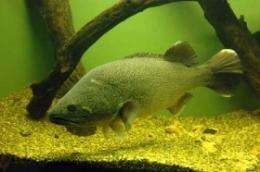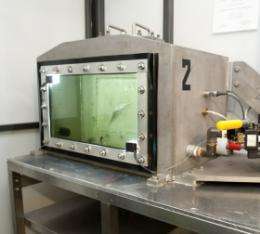A Murray Cod found in the Murray Darling Basin at the NSW Fisheries depot at Narrandera. Credit: Arthur Mostead/Murray Darling Basin Authority
Australia's native fish could stand a better chance of survival when passing through hydropower turbines in major waterways thanks to an innovative mechanical chamber developed at UNSW, which is nominated for a top engineering prize.
When native fish migrate downstream they often pass through hydropower turbines and weirs. If they evade impact with the blades, fish can still suffer injury and even death due to extreme and rapid pressure changes when they go from deep water upstream to shallower waters.
These pressure injuries, which include expanded swim bladders, are similar to the expansion injuries scuba divers might experience when surfacing too quickly. They are known as "barotrauma".
"The pressure change these fish experience is like going from 10 metres below the water to the height of Mount Everest in about half a second," says Mr Brett Miller, principal engineer and inventor from the UNSW Water Research Laboratory.
Miller and the team at the Water Research Laboratory have developed a pair of custom hydraulic "barochambers" that can simulate those rapid pressure changes. These will measure the decompression limit that fish can safely endure and guide the design of more environmentally and fish friendly water infrastructure.
The invention is nominated for two Engineers Australia Excellence Awards, which will be announced today (Friday 20 September).
Hydraulic chambers will simulate extreme pressure changes to test the decompression limits fish can safely endure. The chambers are nominated for best new invention at the Engineers Australia Excellence Awards. Credit: Water Research Lab
Mini hydropower generators throughout the Murray Darling provide renewable energy to regional communities, but Miller says more research is needed on the potential risk of these generators on native fish populations.
"Fish welfare at river infrastructure is a problem in Australia and globally," says Miller. "Safe passage needs to be considered at the construction and approval phases of hydropower infrastructure, and not as an afterthought."
"This system allows us to measure fish mortality and injury against decompression rates," he says.
Provided by University of New South Wales






















